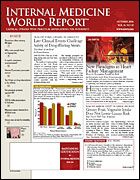Publication
Article
Internal Medicine World Report
Even Slight Overweight at Middle Age Increases Risk of Death
Author(s):
Wake-Up Call for Baby Boomers
Are you spending more time counseling your obese patients about the dangers of excess weight, while overlooking patients who are only slightly overweight? In light of new findings, this could be a win–lose strategy.
Two studies published in the New England Journal of Medicine show that overweight is also associated with higher mortality. These findings, which could have a major impact on millions of patients who think that being slightly overweight is not a serious health problem, are the first to identify a positive correlation between overweight (body mass index [BMI] 25.0-29.9 kg/m2) and mortality.
The first study (2006; 355:763-778) prospectively examined BMI in relation to the risk of death from any cause in 527,265 men and women in the National Institutes of Health—AARP cohort who were aged 50 to 71 years at baseline (in 1995-1996). Alternative analysis was conducted to address possible biases stemming from preexisting chronic diseases and smoking status.
A total of 61,317 participants (42,173 men and 19,144 women) died during 10 years of follow-up, which ended in 2005. Mortality risk was increased among both men and women in the highest and lowest BMI categories at baseline, regardless of race/ethnicity or age. When only healthy people who had never smoked were analyzed, both overweight and obese men and women were found to be at higher risk of death.
When the analysis was limited to BMI during midlife (age 50 years) among participants who had never smoked, the associations strengthened, with the mortality risk increasing by 20% to 40% among overweight participants and by 2 to 3 times among obese participants.
Compared with men who had a BMI of 23.5 to 24.9 at age 50 years, morbidly obese men (BMI ≥40) had a multivariate risk of death of 3.82. The corresponding relative risk among morbidly obese women was 3.79. The higher risk for mortality among underweight patients remained but was weakened, with only 18 men and 32 women who were underweight at age 50 dying during follow-up.
Overall, increased weight was responsible for approximately 7.7% of all premature deaths among men and 11.7% of all such deaths among women. Among those who had never smoked, excess weight was responsible for 18.7% of all premature deaths among men and 18.7% of all such deaths among women.
Lead author Kenneth F. Adams, PhD, of the National Institutes of Health, told IMWR that while it is generally accepted that obesity is related to higher mortality, the same correlation with overweight has been controversial. “Although the question seems straightforward, smoking and preexisting disease have a strong potential to distort the answer.”
He pointed to some strengths of this study, including the large sample size and the ability to analyze BMI at midlife. “Using these methods we were able to demonstrate that overweight is related to an increased risk of death. In addition, we found that the risks of obesity are larger than often reported.”
The second study (2006; 355:779-787) looked at the association between body weight and risk of mortality in a 12-year prospective cohort study of 1.2 million Koreans (aged 30-95 years). A total of 82,372 deaths from any cause were examined, in addition to 48,731 deaths from specific diseases (ie, 29,123 from cancer, 16,426 from atherosclerotic cardiovascular [CV] disease, and 3362 from respiratory disease).
Among both men and women, the average baseline BMI was 23.2, and the mortality rate from any cause demonstrated a J-shaped association with BMI, regardless of smoking history. Patients with a BMI of 23.0 to 24.9 had the lowest risk of death from any cause (Table). Overall, the risk of death from respiratory causes was higher among those with a lower BMI, while the risk of death from atherosclerotic CV disease or cancer was higher among those with a higher BMI. Increasing age (≥65 years) mitigated the increased relative risk of death among those with a higher BMI.
During follow-up, 58,312 men died (ie, 22,249 from cancer, 10,486 from atherosclerotic CV causes, and 2442 from respiratory causes), and 24,060 women died (ie, 6874 from cancer, 5940 from atherosclerotic CV causes, and 920 from respiratory causes).
The interaction between BMI category and age was significant (P <.001), as were the interactions between BMI and gender and BMI and smoking history (P <.001 for both).
In an accompanying editorial (pages 758-760), Tim Byers, MD, MPH, of the University of Colorado School of Medicine, Denver, writes that the AARP study “clearly shows that if the effects of smoking are set aside, at age 50, when the prevalence of chronic disease is low, there is also an elevated risk of death for persons whose BMIs are well below 30.”
Calling these findings “sobering,” Dr Byers reminds physicians that obesity is a global problem that will likely “contribute to the pandemic of chronic diseases for many years to come.”
Dr Adams comments, “Our hope is that these findings will provide the basis for further efforts by public health officials and clinicians to counsel the public and patients in maintaining a healthy weight throughout life.”






